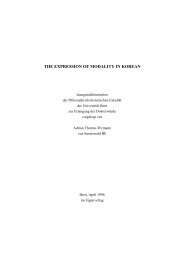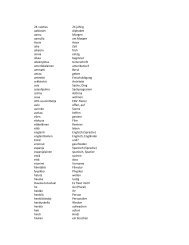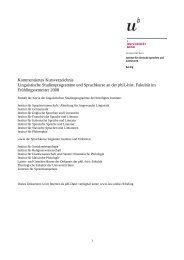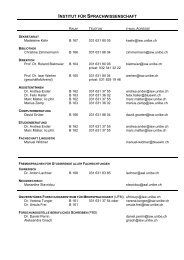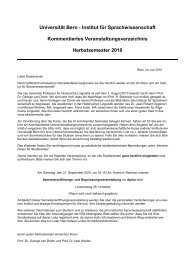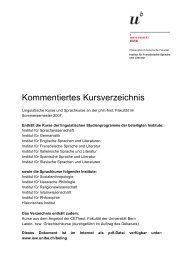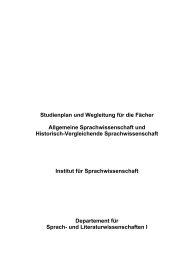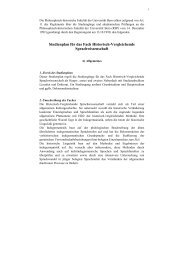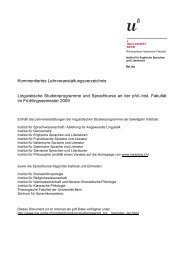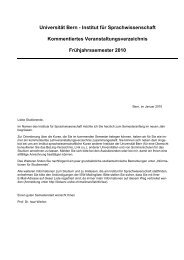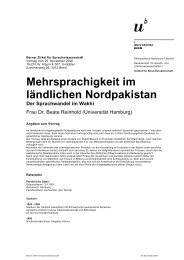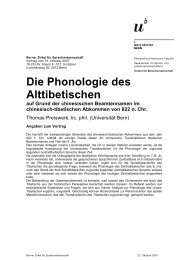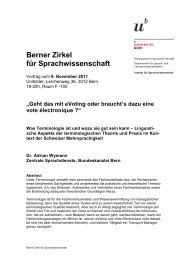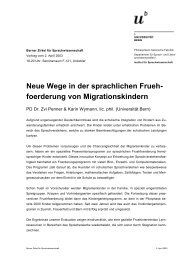BeLing HS 07 - Institut für Sprachwissenschaft - Universität Bern
BeLing HS 07 - Institut für Sprachwissenschaft - Universität Bern
BeLing HS 07 - Institut für Sprachwissenschaft - Universität Bern
Sie wollen auch ein ePaper? Erhöhen Sie die Reichweite Ihrer Titel.
YUMPU macht aus Druck-PDFs automatisch weboptimierte ePaper, die Google liebt.
BA Course Module:<br />
Ling M3/I<br />
LIZ:<br />
Proseminar<br />
Title:<br />
Phonetics and Phonology<br />
Instructor(s):<br />
F. Andres Morrissey<br />
Time(s): Thursday 10-12<br />
First Session(s): 27.9.<strong>07</strong><br />
Level:<br />
BA/MA: Second-year students<br />
Liz: Students in their basic studies<br />
Credit Points: BA/MA: 3/Liz.: 3<br />
Open to students as Wahlbereich? Yes<br />
No<br />
Content: This course focuses on the sound system of English but will take into consideration the speech sounds<br />
of other languages which the students may be familiar with. We will begin by exploring how speech sounds are<br />
produced, how they can be described systematically and how they are represented in the International Phonetic<br />
Alphabet (IPA). We will then move on to looking at how speech sounds, mainly in English, influence each other in<br />
spoken language, how fluent speech affects pronunciation and what effect this has on possible combinations of<br />
speech sounds in English words. Going beyond individual sounds we will consider the nature of syllable formation<br />
in English, of rhythm and intonation. To round off the course we will look at applications of phonetics and<br />
phonology in practical research, for example in the reconstruction of older forms of the language and in dialects of<br />
English.<br />
Texts: Handouts will be distributed in the course. Students are free to consult introductory text books. However,<br />
all the material that needs to be covered for the exam will be in the handouts.<br />
Notice also that this course will be available as a podcast and can be downloaded either from the regular<br />
downloads page www.morrissey.unibe.ch or from the podcast server http://podcast.unibe.ch/podcastserver/<br />
Aims: At the end of the course students should be able to describe speech sounds in English as well as<br />
understand the basics of speech production; transcribe words, phrases and short passages in IPA; be able to<br />
discern phonological patterns from data given and formulate simple phonological rules; show how syllabification<br />
works on the basis of phonotactics and have a basic understanding of stress and intonation.<br />
Credit: Credits for the course are based on regular attendance and completion of all course work and<br />
evaluations.<br />
Evaluation (Leistungskontrolle):<br />
Test/Exam<br />
Oral Presentation<br />
Evaluation at end of entire Module only<br />
Date of Evaluation:<br />
Throughout semester<br />
During semester break<br />
Other:<br />
Written Assignment(s)<br />
Other Class Work<br />
Other:<br />
Last week of semester<br />
To be advised<br />
BA Course Module:<br />
Ling M4<br />
Module Name:<br />
Advanced Studies in Linguistics<br />
Title:<br />
Varieties of English<br />
Instructor(s):<br />
M. Locher<br />
Time(s): Thursday 10-12<br />
First Session(s): 27.9.<strong>07</strong><br />
Level:<br />
BA/MA: Third-year students<br />
Liz: Students in their basic studies<br />
Credit Points: BA/MA: 4.5/Liz.: 6<br />
Open to students as Wahlbereich? Yes<br />
No<br />
Content: The general topic of this course is the study of varieties of English. We will start with overview sessions<br />
on the spread of English and then we will move to the question of how varieties of English are studied in<br />
linguistics. After these theoretical sessions, we will focus on American English as one particular field of research.<br />
We will not only be concerned with what is considered standard General American, but also with African<br />
American Vernacular English (AAVE), Chicano English and other more local varieties of English spoken on the<br />
North American continent. Next to contemplating the microlinguistic levels of the description of American English<br />
varieties, we will also consider cultural, sociological and historical influences on their development..<br />
25



